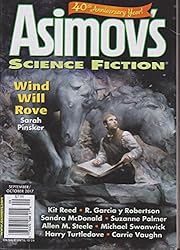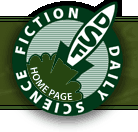Our weekly exploration of free and inexpensive short fiction available on the internet. This week we begin focusing on the 2017 Nebula award nominees in the short fiction categories.

![]() Wind Will Rove by Sarah Pinsker (2017, originally published in Asimov’s, Sept-Oct 2017 issue; free PDF available at the author’s website). 2017 Nebula nominee (novelette)
Wind Will Rove by Sarah Pinsker (2017, originally published in Asimov’s, Sept-Oct 2017 issue; free PDF available at the author’s website). 2017 Nebula nominee (novelette)
Rosie, the 55 year old narrator, is a history teacher on board a generation ship that has been voyaging through space for the better part of a hundred years, and will be traveling for many more years. She’s also an accomplished fiddler, part of a band of fiddlers, guitarists, mandolinists and banjo players that plays weekly at the OldTime gathering. They play the songs that group members were able to remember and write down, after an angry computer programmer released a virus that completely destroyed all of the ship’s cultural and historical databases from Earth, including backups, only ten years into the voyage. Only essential databases (navigation, life support, medical, etc.) remained; online history, books, art, film, video games, music and more were permanently deleted, along with all communication capabilities with Earth.
Since this catastrophe, called the Blackout, the people on the ship have had a tendency to cling to everything they have been able to recall of Earth’s culture and history. These fragments from the past are preserved with almost sacred zeal; any change to them is resisted. But now some of the younger generation, led by Rosie’s student Nelson Odell, are pushing back, arguing that the past doesn’t matter to them in their current circumstances, and that learning about Earth’s history is a waste of time.
Sarah Pinsker delves deeply into music and its significance for Rosie and others on the ship. Pinsker’s knowledge of music comes to the fore here, with details that make the descriptions of the OldTime band and a particular song, “Wind Will Rove,” ring with convincing authenticity. In the story, “Wind Will Rove” is based on an old traditional song, “Windy Grove,” that has been lost to those on the ship. Both the title and the song itself have changed through the years, and Rosie finds herself adding her own changes to it, despite disapproval from the traditionalists on board the ship. It’s a wonderful metaphor for their journey, and for the need to balance history and change. Highly recommended. ~Tadiana Jones
![]() “Four-Point Affective Calibration” by Bogi Takács (Feb. 2018, free at Lightspeed, Issue 93; $3.99 Kindle magazine issue)
“Four-Point Affective Calibration” by Bogi Takács (Feb. 2018, free at Lightspeed, Issue 93; $3.99 Kindle magazine issue)
The narrator is hooked into a sort of emotion-reading/translating machine in order to calibrate it and to give them a chance at being part of a team that will attempt to communicate with aliens. Faced with several prompts (anger, sadness, fear/surprise, happiness), the narrator opens up on their personal and professional life in relation to their own sense of difference and alienation.
I really enjoyed this story for its theme, its structure, its voice, and tone, its examination of language, its skepticism about “universal” concepts, and the sense of warmth behind it all. I loved the way the author plays with the narrator as a “resident alien” and an immigrant in a story about actual aliens, the poignancy of the author’s musings on being asked to remove their headscarf, the underlying assumptions made about them based on that headscarf, the way they use “country of origin” rather than “home country.” Just a lovely, and thoughtful, story. ~Bill Capossere

![]() “The Ones Who Chose the Rain” by George Edwards Murray (Feb. 2018, free at Daily Science Fiction).
“The Ones Who Chose the Rain” by George Edwards Murray (Feb. 2018, free at Daily Science Fiction).
A character referred to only as “The Boy” has crossed the “Thousand-Mile forest” with its “Watchful Things” to study the descendants of those who were sentenced millennia ago for committing the “Great Crime.” Their punishment is to live in the chainfield amidst non-stop rain. He tells them, “Nobody calls it the Great Crime anymore,” shows them textbooks written on “The Real Story of the Chainmen,” and then informs them he can stop the rain since the spell is so old and weak. He builds a device to do just that, and the Chainpeople are faced with a new life.
I don’t know that the underlying theme is particularly original here, and it’s a bit predictable, but Murray does an excellent job of creating atmosphere and tone via vivid, lyrical language which I quite enjoyed. ~Bill Capossere
![]() Weaponized Math by Jonathan P. Brazee (2017, originally published in The Expanding Universe, Vol. 3; free on the author’s website to read online or to download). 2017 Nebula nominee (novelette)
Weaponized Math by Jonathan P. Brazee (2017, originally published in The Expanding Universe, Vol. 3; free on the author’s website to read online or to download). 2017 Nebula nominee (novelette)
Staff Sergeant Gracie Medicine Crow, of the United Federation Marine Corps, is an experienced sniper with more kills than anyone else in her platoon. One of the things that makes Gracie so good at her job is her dedicated use of memorization of potential target ranges and other details, in combination with her rifle scope’s firing AI, to mathematically reduce her reaction time between shots.
Gracie is breaking in a new spotter, Lance Corporal Christopher “Rabbit” Irving, and their current mission ― providing security and surveillance for a meeting between a major and the local village commissioners on a distant planet ― seems a good training opportunity. It appears to be a safe, routine mission, but the village suddenly erupts into violence, and now the platoon members’ lives are on the line.
Weaponized Math is a straightforward military SF adventure. Jonathan Brazee is a retired Marine colonel, and the details of a military mission going south certainly ring true. This novelette emphasizes the military values of loyalty and honor, but I didn’t see any real subtleties or deeper meaning in the story. It’s a decent tale, with a minority woman as the main character, but I’m mystified as to why members of the SFWA singled out this particular novelette for a Nebula nomination. ~Tadiana Jones






The Pinsker is amazing – it deserves the Nebula nomination.
So far it’s my clear favorite among the novelettes.